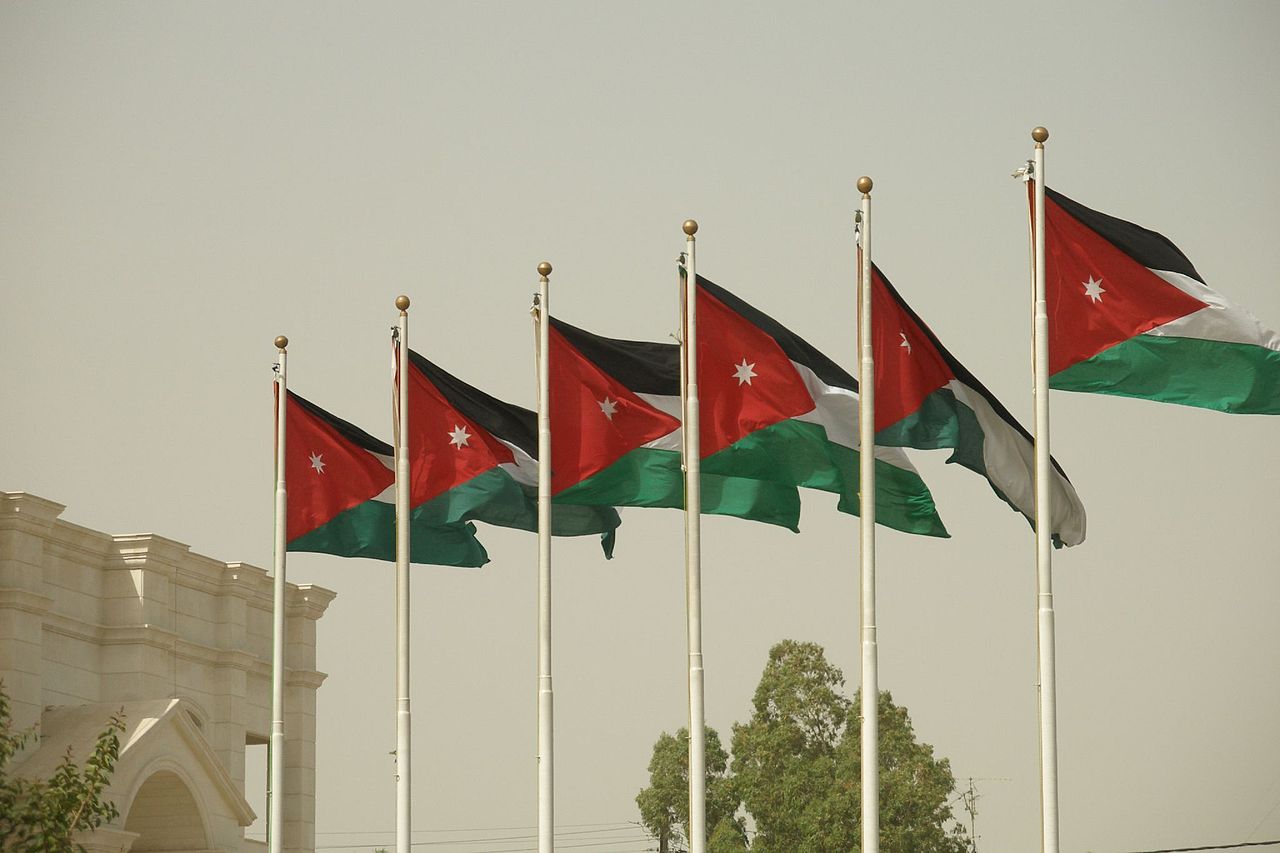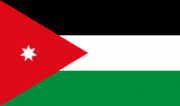
Jordanian flag, Amman, Jordan (Source: Vyacheslav Argenberg/Wikimedia Commons)

JORDAN
 Our Concerns
Our Concerns
- Abuses committed by the General Intelligence Directorate in the context of counter-terrorism, including the practice of torture and incommunicado detention;
- Unfair trials before the State Security Court and the admission of confessions extracted under torture as evidence;
- Judicial harassment of journalists and other dissenting voices under accusations of terrorism or lèse-majesté.
 Upcoming
Upcoming
- October/November 2018: Universal Periodic Review.
In 2017, the number of Syrian refugees registered by the United Nations High Commissioner for Refugees in Jordan reached more than 650,000, while this number is said to have reached 1.3 million according to the Jordanian authorities. The country has the second largest number of refugees per capita after Lebanon.
However, these numbers have remained stable since the closure of the Syrian-Jordanian border in 2015. Nearly 50,000 people remain stranded at Syria’s southern border – also called the “berm” – with little access to food and healthcare. Equally concerning is the summary deportation of Syrian refugees: NGOs have reported that approximately 400 registered Syrian refugees were deported per month during the first half of 2017, in violation of the principle of non-refoulement.
Moreover, on March 4, the authorities executed 15 individuals, moving further away from the 2006 moratorium on the use of capital punishment, which was reinstated in 2014. Attorney General Ziad Dmour declared thereafter that the executions were a signal “to anyone trying to tamper with Jordan’s security”.
Furthermore, in February, the Royal Committee for Developing the Judiciary and Enhancing the Rule of Law, established by the king in the framework of the Comprehensive National Plan for Human Rights, a 10-year initiative that calls for changes to numerous laws, policies, and practices, published its first report. The report included a set of recommendations to improve the judiciary and criminal justice system, but no recommendations were made for anything related to the intelligence services, who are responsible for the majority of human rights abuses in the country.
Following the report’s publication, the parliament adopted a series of measures proposed by the Royal Committee. Among others, amendments were made to the Code of Criminal Procedure as to guarantee all suspects the right to a lawyer from the time of arrest and during interrogations, limits were placed on the use of pre-trial detention, and a legal aid fund was created to provide lawyers for suspects who cannot afford them.

Violations in the framework of counter-terrorism
The advancement of human rights in Jordan continues to be jeopardised by abusive anti-terrorism measures. In October 2017, during the review of Jordan by the HR Committee, the UN experts affirmed that among the most pressing challenges the country faces is finding a “balance between security requests and human rights protection”.
“The advancement of human rights in Jordan continues to be jeopardised by abusive anti-terrorism measures.”
Jordan’s Anti-Terrorism Law contains a vague definition of terrorism, allowing for abuses to be perpetrated by both the General Intelligence Directorate (GID), the country’s intelligence agency that is controlled directly by the king, and the State Security Court (SSC), an exceptional jurisdiction whose members are appointed by the executive.
Cases follow the same pattern: the GID arbitrarily arrests and detains individuals incommunicado for several weeks at a time, including those who have merely exercised their fundamental rights to freedom of opinion, expression, and peaceful assembly. While denied access to the outside world, suspects are tortured and forced to sign self-incriminating statements, before being brought before the SSC Prosecutor, who sits at the GID premises.
This pattern is exemplified by the case of Ramsi Suleiman, a 39-year-old pharmacist, who disappeared in Amman following his arrest by the GID on May 23, 2017. Over the course of two months, his relatives and lawyer went to the GID headquarters repeatedly to enquire about his fate and whereabouts. However, the GID denied his arrest and refused to provide them with any information. It was not until July 16 that his lawyer was allowed to meet with him, and Suleiman was released without any judicial procedure on August 17.
Once victims are charged, they are tried before the State Security Court, which can be considered as neither impartial nor independent. The SSC systematically admits confessions extracted under torture as evidence to sentence defendants to heavy penalties following unfair trials.
In this regard, following Jordan’s review, the HR Committee experts reiterated their recommendation from 1994 and 2010, calling on the authorities to abolish this special court given its lack of independence from the executive and its close relationship with the GID.

Self-censorship and the crackdown on freedom of speech
In Jordan, self-censorship is common among journalists, critics and peaceful activists, who are routinely prosecuted on trumped-up charges of “terrorism”, such as disturbing “the public order” or “relations with a foreign country,” which are often coupled with crimes of lèse-majesté, including “insult to the king”, which is punishable by one to three years of imprisonment. For example, in January 2017, around 20 activists who had denounced corruption were arrested by the GID and brought before the SSC on charges of “insult to the king” and “undermining the political regime”, the latter of which is considered an act of terrorism.
“In Jordan, self-censorship is common among journalists, critics and peaceful activists.”
In its concluding observations of November 2017, the HR Committee expressed concern over such a broad definition of terrorism, which can be used to “stifle dissent”. The UN experts recommended that Jordan ensure that terrorist acts are defined in accordance with international standards.
The UN experts also condemned the fact that journalists continue to face prosecution if they express views considered by the authorities to be critical. In 2017, Reporters Without Borders ranked Jordan 138 out of 180 countries with regards to press freedom. Although journalists cannot face imprisonment if they violate the Press and Publication Law, they can be imprisoned under the 2010 Cybercrime Law. The latter seriously hampers the freedom of speech of not only media professionals but also ordinary citizens.
It is under this piece of legislation that Hussam Al Abdallat, a former government official, journalist and anti-corruption activist, was charged with “defamation on social media” and detained for a month in June 2017 for having criticised corruption within the Jordanian government on Facebook. He was released on bail on June 22, 2017, but the charges have not yet been dropped.

UN group calls for release of two arbitrarily detained Jordanian citizens
I n 2017, upon Alkarama’s request, the UN Working Group on Arbitrary Detention (WGAD) issued two Opinions on Jordanian cases, both denouncing a pattern of unfair trials and the admission of self-incriminating statements extracted under torture.
At its April session, the WGAD deemed the detention of Ghassan Mohammed Salim Duar as arbitrary. This civil engineer was arrested without a warrant on October 29, 2014 at his house during a night raid conducted by the GID and the General Security. On July 29, 2015, he was sentenced by the SSC to five years of imprisonment under the Anti-Terrorism Law, although his trial was solely based on confessions he was forced to sign under torture while he was detained incommunicado in the premises of the GID.
The UN experts pointed out that “Duar was arrested in violation of procedures established by law as no warrant was produced”, “authorities held him incommunicado in solitary confinement for 15 days at the GID premises, placing him outside the protection of the law”, and he “was not treated with humanity and respect during his deprivation of liberty as he was subjected to torture”.
At its August meeting, the WGAD adopted another Opinion calling for the immediate release of 20-year-old Hatem Al Darawsheh, who is currently detained in a maximum-security prison following an unfair trial before the SSC. Al Darawsheh, a high school student at the time, was at home on January 19, 2016 when members of the GID broke in and arrested him without any warrant.
Al Darawsheh was held incommunicado for a month, as he was denied all access to the outside world, including his family and lawyer. When his relatives were finally allowed to visit him, they found that he had been severely tortured by GID officers. On December 5, 2016, the SSC sentenced him to three years of imprisonment under the Anti-Terrorism Law for allegedly supporting IS.
However, the WGAD denounced “the failure by the investigative judge to open an investigation into his allegations of torture, despite the testimony provided by other inmates.” Al Darawsheh’s confession extracted under torture during his incommunicado detention was used as the sole evidence to indict him with “promoting a terrorist organisation”.
The Jordanian authorities have not yet implemented the decisions and the two men remain in detention despite the WGAD’s calls for their release.